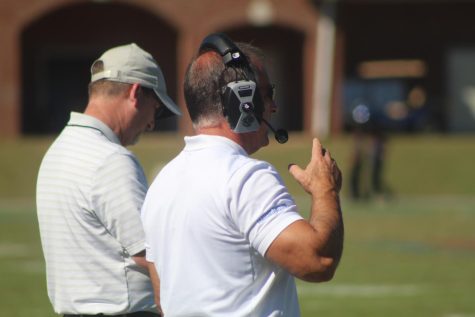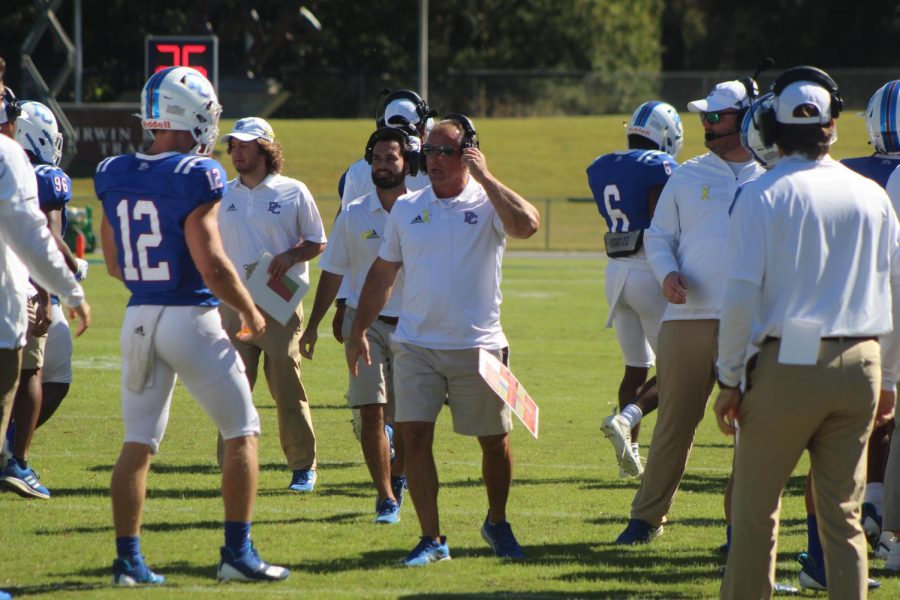Opinion: Overtime’s Documentary on Former Blue Hose Football Coach Shows the Good, the Bad, and the Ugly of Never Punting in College
Former PC football coach Kevin Kelley (middle) walks on the sidelines during a timeout.
August 18, 2022
Kevin Kelley’s one and done tenure at Presbyterian College was one of the most memorable seasons in all of college football’s history, with fans recently getting a behind-the-scenes look at all of the drama.
Over the summer, Overtime SZN, one of the most popular YouTube channels for sports coverage, released an exclusive 12-part episodic series on Kelley’s first season in Clinton called To The House. The channel also covered seasons of the former coach at Pulaski Academy prior to his arrival at PC, where he developed the reputation as “The Coach Who Never Punts.”
Players from the past season such as Jalyn Witcher, Ren Hefley, Evan Murphy, and Kiaran Turner are seen dominantly throughout the series through interview segments in addition to Kelley himself.
For sports fans out there who love documentaries such as HBO’s Hard Knocks or Netflix’s Last Chance U, I highly recommend checking out Overtime’s series on Kelley. Oftentimes, fans never get to see how the pizza is prepared and cooked to perfection, and the mini documentary provides a larger view on how football teams are constructed each year.
But in this situation, the pizza came out undercooked.
Despite starting 2-0, setting national records on offense, and gaining attention from multiple media outlets, PC finished 2-9 with the Blue Hose going 0-8 in conference play, allowing opponents to earn 53.6 points per game, giving up 2,602 rushing yards total on defense, and the offense throwing 34 interceptions combined.
Kelley resigned following the season and moved back to his home state of Arkansas, where he briefly took an analyst job remotely with the New England Patriots. Right now, the former USA Today High School Coach of the Year is working in the business world in Little Rock, undecided if he wants to return to coaching anytime soon.
From the PC perspective, a number of players transferred to other schools in the offseason, and the Blue Hose will once again try and build a consistent winning team under new coach Steve Englehart while still facing the challenges of playing in the Pioneer Football League, a non-scholarship football conference.
Nevertheless, with all of the episodes uploaded online, the series does provide a strong look, in my opinion, as to why Kelley went from hero to zero during his tenure as well as some of the struggles he faced on and off the sidelines.
Poor Personal Choice
One of the first major decisions as a new coach is figuring out the roster situation, which can include adding players from the transfer portal, signing guys from the high school ranks, and giving more opportunities to certain players than they had previously.
Oftentimes, though, one bad decision could haunt the team for the rest of the season.
The Blue Hose had an experienced quarterback, Tyler Huff, who threw for 1,465 yards and ten touchdowns as a second team All-Conference selection during the 2021 spring football season.
Not only was he a decent starter, but he was also a strong leader in the PC locker room, gaining the trust of several of his teammates.
Instead of choosing Huff, Kelley decided to go with his own instincts.
Ren Hefley came over from the University of Michigan and was named the starter. He also had experience playing for Kelley during his high school coaching days in Arkansas. While promising at the beginning, Hefley’s regime at the quarterback position was rotten at best, throwing more interceptions in a season (31) than Huff’s first two years combined (13).
While he did play in a few of PC’s early contests, Huff instead prepared for the future by redshirting the remainder of the season, getting ACL reconstruction surgery, and graduating in the spring. The former starter is now up the road at Furman where he will compete as a graduate transfer for the Paladins.
Unfortunately, Kelley’s decision to go with Hefley over Huff turned out to be something that would affect his ability to coach the team for the remainder of the season.
Losing Trust
Oftentimes, coaches at new jobs face the daunting task of trying to earn the players’ confidence and respect, which can include the establishment of a new playbook, culture, and expectations throughout the building.
Earning trust and respect can certainly take time for new coaches in charge of a program. But in some situations, one mistake could cost the coach dearly, and the choosing of the brand new, but unproven car over the older, reliable one cost Kelley his locker room dearly.
With a new scheme that had not been tested in college beforehand and the replacement of the highly popular player Huff, in addition to his implementation of his high school playbook, Kelley faced a challenge to regain the trust of his players.
High school football at Pulaski is not the same as college football at Presbyterian. The players are older, more mature, and developing their own critical thinking skills when it comes to certain situations that they face.
Instead, Kelley seemed to take a “me or the highway” approach to try to implement his scheme as shown throughout several of the episodes, especially early on.
In the series, the defense looks exhausted trying to stop opposing offenses with a shorter field. The offense goes for a long “fourth and twenty” instead of winning the field position during a game. Missed two-point conversions and failed onside kick recoveries might have been the difference in a few of PC’s contests in terms of momentum.
Kelley even violated his own reputation by punting the football and trying other unique tactics to make things better, but nothing worked in the end.
Outside the field, the locker room was not a favorable atmosphere either as multiple episodes show Kelley not gaining favor for his attempts at motivating his players, and rumors began swirling of players intentionally making bad plays to make him look bad.
Football is a game of inches on and off the field, and every single one of them matters. As the series shows, Kelley failed to earn an inch with any of his players.
He tried different tactics to get players motivated to play their best, but these did not matter. Once one apple went bad, the entire batch proceeded, and that’s exactly what happened inside the Blue Hose locker room under Kelley’s watch.

Immaturity
As stated earlier, the college game is totally different from the high school game since most of the players act like young men rather than kids. Because of this, coaches in college often have to treat their players as adults in order for their programs to exceed goals and expectations during game day.
Kelley, however, treated the majority of his players like his Pulaski players, making his overall situation worse.
This included instances of yelling at running back Nnamdi Orjioke for being himself, taking the players’ phones away prior to a 72-0 blowout loss to Campbell for no reason, and losing it over star receiver Kiaran Turner having a bad practice.
With an already divided locker room because of his coaching tactics, it didn’t help Kelley’s case at all for making life miserable for some of the players trying to learn a new scheme and exceed the coaches’ expectations.
Simply put, he was way over in his head and when he realized the errors he made on the program, it was too little, too late.
Kelley apologized for the season and admitted that some of his players didn’t like him as their coach, but it showed that a coach that failed to relate to his players and their personalities, instead of showing the true realities of what the real world will be following their college careers.
The Reality of No Scholarships
College programs across the country are not the same tier-level in terms of job quality despite being in the same conference or level. Some are good, bad, or down-right average.
Presbyterian historically has been a tough job since its transition to Division I in the mid-2000s. Several losing seasons, bad recruiting cycles, and poor decisions have cost the Blue Hose mightily, while other similar schools in the state have succeeded in their transition to Division I.
With their acceptance into the Pioneer Football League, one might think a job like PC’s is similar to one climbing up the Himalayas Mountains with no gear to protect themselves.
This isn’t a section of the story to bash the College on, but really just a reality of a situation of what the Blue Hose are in at this moment of time. Being a college coach in the Pioneer Football League is a daunting task since players aren’t required to attend summer workouts, be a part of team meetings, and only have around three weeks total to learn a whole new playbook.
Unlike other college football programs with scholarships, Kelley faced a number of these challenges throughout the episodes and as a result, viewers could tell from his eyes talking that he had no idea how to build a program without scholarships.
He looked miserable as a camel with no water in the desert. Simply put, he underestimated the challenge of what a job like PC would bring.
From the players’ perspective, the series does show the challenges of trying to make it through a non-scholarship school, hoping to have that opportunity to play post-college.
One highlight of this is shown near the end of the series where Kelley offered a player, running back Tyleer Sealey, to mow his lawn so that he could earn a few extra bucks.
This goes to show that some players have to rely on earning money not only to pay for their school, but to continue their chances and dreams of playing football once they graduate and leave Clinton.
Final Thoughts
Throughout the history of football, there’s several reasons why coaches fail to adapt to a certain level of the game when moving up the ranks.
Whether it’s college to the NFL or high school to college, coaches either don’t have the experience in that particular level or are ignorant in adapting to the new level than what they are used to.
And as the series has shown, Kelley is another victim of this trend.
I will admit, I was wrong when PC hired Kelley. I’ve been wrong before and I will be wrong again. I thought during that certain period of time, the Blue Hose needed to hire some outside the box who could make the program relevant. In which case, seats at Bailey Memorial Stadium could once again be filled at one of the toughest football jobs in all of college football.
One could argue if he had scholarships, better facilities, and better talent, maybe things would have turned out differently. Even with those resources, I strongly doubt anything would’ve been different with exception of maybe a game or two.
Hindsight is 20/20, but maybe PC should’ve kept Tommy Spangler for at least one more year or gone for someone similar in building a strong team culture instead of taking a massive gamble at a Las Vegas casino.
Is the PC football program more damaged permanently after Kelley’s tenure? I don’t know. The program is already in limbo with the situation they are in and Kelley’s disastrous season didn’t help at all.
But I will say this: this should serve as a friendly reminder to all athletic directors, general managers, and NFL owners across the country. Unless they have strong experience in that particular level you’re in, never hire a coach just because they had success somewhere else in a different climate.
Because you’re going to get the good, the bad, and the ugly.





